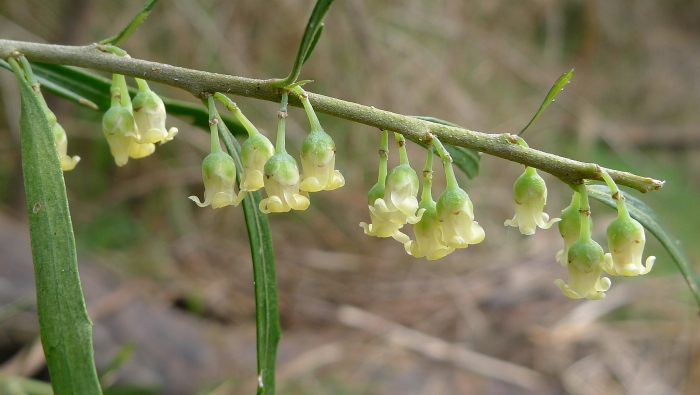Tree Violet
(Melicytus dentatus)
Tree Violet (Melicytus dentatus)
/
/

John Tann
CC BY 2.0
Image By:
John Tann
Recorded By:
Copyright:
CC BY 2.0
Copyright Notice:
Photo by: John Tann | License Type: CC BY 2.0 | License URL: https://creativecommons.org/licenses/by-sa/2.0/ | Uploader: John Tann | Publisher: Flickr |

























Estimated Native Range
Summary
Melicytus dentatus, commonly known as Tree Violet, is an evergreen shrub native to the understory of temperate rainforests and moist eucalypt forests in Eastern Australia and Tasmania. It typically grows up to 4 meters in height and features branchlets that may have spines. The leaves are 5 to 50 mm long, often toothed, and have a leathery texture. During spring and summer, it produces inconspicuous pale yellow flowers, 3 to 5 mm in length, with petals that recurve at the tips. These flowers give way to pale green to purple-black, rounded berries, 4 to 5 mm in diameter, which are a food source for Cunningham’s spiny-tailed skinks.
Tree Violet is valued for its dense foliage and spiny branches, which can provide a protective habitat for small birds and other wildlife. It is used in cultivation for hedging, screening, and as an ornamental shrub in gardens that mimic its native forest environment. It is adaptable to a range of light conditions, from full sun to part shade, and prefers soils with good drainage, although it can tolerate various drainage speeds. While it requires medium amounts of water, it can withstand periods of drought once established. Gardeners should be aware that the spines may require caution when planting in areas with pedestrian traffic.CC BY-SA 4.0
Tree Violet is valued for its dense foliage and spiny branches, which can provide a protective habitat for small birds and other wildlife. It is used in cultivation for hedging, screening, and as an ornamental shrub in gardens that mimic its native forest environment. It is adaptable to a range of light conditions, from full sun to part shade, and prefers soils with good drainage, although it can tolerate various drainage speeds. While it requires medium amounts of water, it can withstand periods of drought once established. Gardeners should be aware that the spines may require caution when planting in areas with pedestrian traffic.CC BY-SA 4.0
Plant Description
- Plant Type: Shrub
- Height: 0.5-1 feet
- Width: 1.5-2 feet
- Growth Rate: Moderate
- Flower Color: Yellow
- Flowering Season: Spring, Summer
- Leaf Retention: Evergreen
Growth Requirements
- Sun: Full Sun, Part Shade
- Water: Medium
- Drainage: Slow, Medium, Fast
Common Uses
Low Maintenance
Natural Habitat
native to the understory of temperate rainforests and moist eucalypt forests in Eastern Australia and Tasmania
Other Names
Common Names:
Scientific Names: , Hymenanthera dentata, Melicytus dentatus, Hymenanthera banksii, Hymenanthera oblongifolia, Solenantha spinosa,
GBIF Accepted Name: Melicytus dentatus (R.Br. ex DC.) Molloy & Mabb.